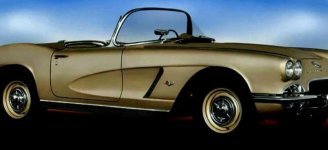teamzr1
Supporting vendor
A Florida man is battling it out in court after he discovered his 1962 Corvette,
which he’s owned for nearly 20 years, has the same VIN (Vehicle Identification Number) as a car now owned by a Texas couple.
Now, Dale Wilkinson is asking a federal judge in Texas to declare his ’62 the real car and has sued the owners of the other example, claiming their car is actually just a clone of his Corvette and could cost him hundreds of thousands of dollars if he ever tries to sell his.
“The loser has to go to their state police and have a whole new VIN issued for the car, and that ruins the value,” said Stephen Gehringer, a lawyer representing Wilkinson in the lawsuit. “It’s no longer a collectible item.”
Wilkinson says he bought his car in 2006 in Massachusetts, then found out about the alleged clone in 2022 after moving to Florida.
His lawsuit alleges that the duplicate VINs are not a simple paperwork error, but that someone actually built the Texas car intending to deceive others. Wilkinson points out that his claimed genuine car had more than 56,000 miles on it when he bought it, while the Texas car showed only 1,283.
Furthermore, an expert hired by Wilkinson claims that the Texas car’s VIN tag is made of aluminum, not the actual steel used, and doesn’t even use the correct font.
The suit doesn’t accuse the current owners of the Texas car of building the alleged fake, but this incident proves the importance of valid documentation whenever purchasing a collector car
Gehringer, whose Pennsylvania firm specializes in such cases, says incidents like this are rare but not unheard of.
The popularity of collector Corvettes makes them tempting to scammers, who have been known to rip off unsuspecting buyers by using online lists of VINs for Corvettes believed lost to junkyards and accidents.
The Texas couple bought the alleged fake at a prominent online auction, but you can’t assume the auction house has made sure that the VINs are legitimate when you buy a car there. The Wilkinson suit doesn’t name Mecum, as the company has managed to legally insulate itself from claims involving inauthentic cars, according to Gehringer.
The next step, after a status conference in June, gives the two sides until November to mediate their dispute.

which he’s owned for nearly 20 years, has the same VIN (Vehicle Identification Number) as a car now owned by a Texas couple.
Now, Dale Wilkinson is asking a federal judge in Texas to declare his ’62 the real car and has sued the owners of the other example, claiming their car is actually just a clone of his Corvette and could cost him hundreds of thousands of dollars if he ever tries to sell his.
“The loser has to go to their state police and have a whole new VIN issued for the car, and that ruins the value,” said Stephen Gehringer, a lawyer representing Wilkinson in the lawsuit. “It’s no longer a collectible item.”
Wilkinson says he bought his car in 2006 in Massachusetts, then found out about the alleged clone in 2022 after moving to Florida.
His lawsuit alleges that the duplicate VINs are not a simple paperwork error, but that someone actually built the Texas car intending to deceive others. Wilkinson points out that his claimed genuine car had more than 56,000 miles on it when he bought it, while the Texas car showed only 1,283.
Furthermore, an expert hired by Wilkinson claims that the Texas car’s VIN tag is made of aluminum, not the actual steel used, and doesn’t even use the correct font.
The suit doesn’t accuse the current owners of the Texas car of building the alleged fake, but this incident proves the importance of valid documentation whenever purchasing a collector car
Gehringer, whose Pennsylvania firm specializes in such cases, says incidents like this are rare but not unheard of.
The popularity of collector Corvettes makes them tempting to scammers, who have been known to rip off unsuspecting buyers by using online lists of VINs for Corvettes believed lost to junkyards and accidents.
The Texas couple bought the alleged fake at a prominent online auction, but you can’t assume the auction house has made sure that the VINs are legitimate when you buy a car there. The Wilkinson suit doesn’t name Mecum, as the company has managed to legally insulate itself from claims involving inauthentic cars, according to Gehringer.
The next step, after a status conference in June, gives the two sides until November to mediate their dispute.

